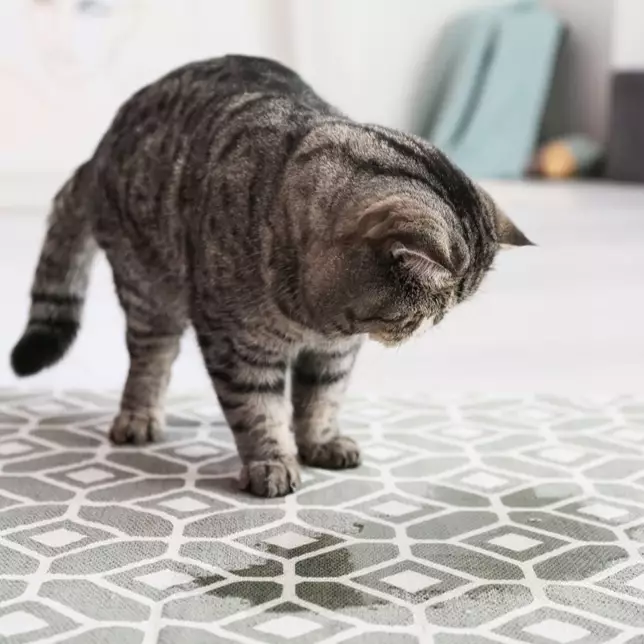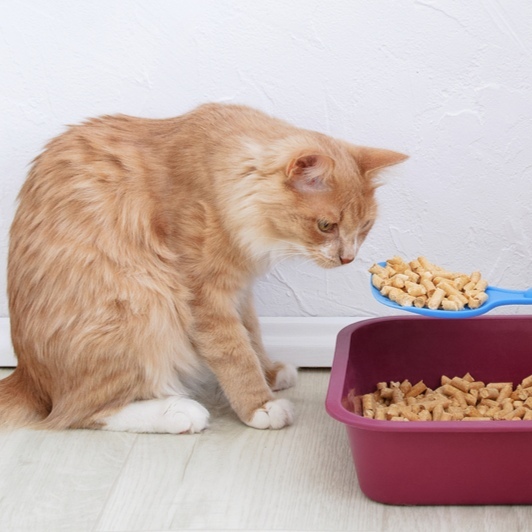Pancreatitis in cats
What is pancreatitis in cats?
Pancreatitis, inflammation of the pancreas, is a relatively common disease in dogs and cats. The pancreas is a small fleshy organ located between the stomach and small intestine.
It is part of both the endocrine and digestive systems, carrying out a dual function in animals. In its endocrine function, the pancreas produces hormones such as insulin, which regulates glucose metabolism and blood sugar levels. In its digestive function, it produces enzymes that are involved in digestion of food.
When pancreatitis in cats occurs, the digestive enzymes are activated prematurely in the pancreas itself rather than in the small intestine, or they are forced out of the pancreas and into the abdominal area and surrounding organs. The digestive enzymes will begin to break down fat and proteins in the pancreas and other organs, which can have serious consequences. Because of their proximity to the pancreas, the abdomen, kidneys and liver can become inflamed and possibly infected. If bleeding occurs in the pancreas, shock and possibly death can follow.
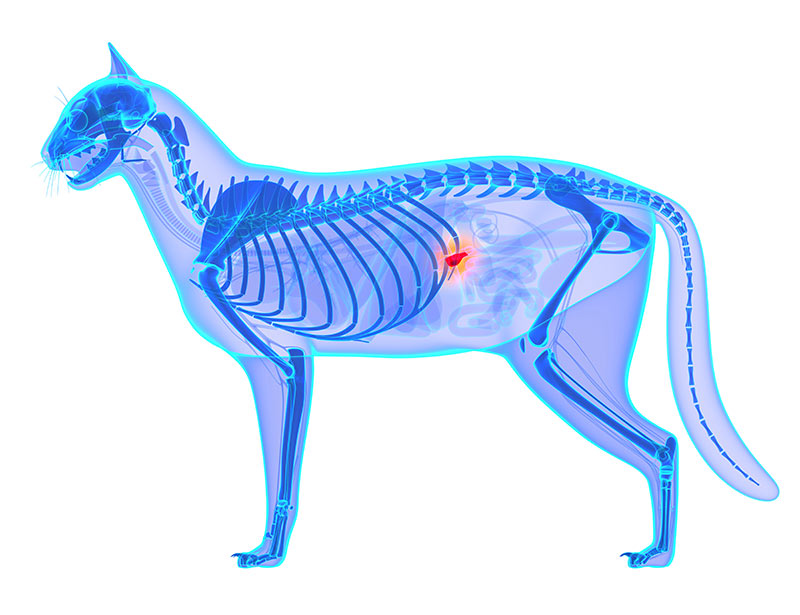
Some cats may have recurrent bouts of pancreatitis; this is termed chronic pancreatitis. In cats, pancreatitis is often part of a larger inflammatory condition that typically involves the liver and intestine, in addition to the pancreas. The combination of inflammatory disease of the pancreas, liver and intestines is so common in cats that it has been termed “triaditis.” It is generally recognised that most cats diagnosed with one of these conditions have some degree of the other two as well.
Pancreatitis in cats is thought to be more common in females than in males, and more prevalent in elderly cats. In the past it was thought that the incidence of pancreatitis in cats was low, but recent studies suggest the opposite. The true incidence of the disease is unknown, however, as many mild cases of pancreatitis in dogs and cats are not presented to a veterinarian.
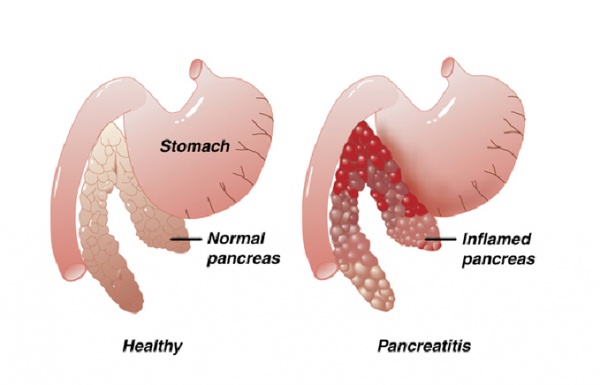
Pancreatitis in cats. Healthy pancreas compared with inflamed pancreas
Source: https://vcahospitals.com/-/media/vca/images/lifelearn-images/pancreatitis1scaler.ashx
What are the symptoms of pancreatitis in cats?
The symptoms of pancreatitis in cats are quite variable, and usually differ from the common symptoms of pancreatitis in dogs such as vomiting and abdominal pain. In cats, vomiting and abdominal pain may or may not occur. The typical symptoms of pancreatitis in cats are not specific for pancreatitis but are similar to those of many other diseases in cats may and include:
- Lethargy, fatigue
- Fever
- Nausea
- Vomiting
- Diarrhoea
- Absent or decreased appetite (anorexia)
- Weight loss
- Dehydration
- Abdominal pain
- In severe cases, acute shock or death
Causes of pancreatitis in cats
There is no clear specific cause of pancreatitis in cats. While there are a number of possible causal factors that may play a role, in the vast majority of cases no single specific cause can be identified. Unlike pancreatitis in dogs, feline pancreas is not thought to be related to nutritional factors. Some of the possible causes or contributing factors to pancreatitis in cats, may include:
- Metabolic disorders such as hypercalcemia (high amounts of calcium in the blood)
- Reaction to certain medications (e.g. antibiotics and some anti-cancer drugs)
- Abdominal surgery or other trauma to the abdomen (e.g. car accident, fall)
- Shock or other conditions that could affect blood flow to the pancreas
- Inflammation or other small intestine disease (e.g. inflammatory bowel disease)
- Bile duct disease
- Liver disease
- Diabetes mellitus
- Parasitism
- Certain types of infections (e.g., toxoplasmosis or feline distemper)
- Exposure to organophosphate insecticides
- Genetics (Siamese cats seem to be at greater risk than other cats, which suggest a possible genetic component to the disorder)
- Scorpion stings (the venom from a scorpion can cause the pancreas to react, leading to inflammation)
- Infection, such as feline herpesvirus, toxoplasmosis, feline infectious peritonitis, feline parvovirus
How is pancreatitis in cats diagnosed?
Diagnostic tests for pancreatitis have historically been problematic for vets. Many cases of pancreatitis in cats have gone undiagnosed because of the nonspecific, vague clinical signs and the lack of a highly sensitive and specific diagnostic test. To further complicate matters, pancreatitis in cats often develops concurrently with other diseases, such as fatty liver disease, inflammation of the liver and bile ducts and inflammatory bowel disease.
The diagnosis of pancreatitis in many cases has been tentative or presumptive, based solely on clinical signs and medical history. Blood tests and medical imaging can be useful to achieve a diagnosis of pancreatitis in cats by revealing a variety of changes, however, these are not specific for pancreatitis and many indicate the involvement of other organ systems.
Blood work
In most cases of suspected pancreatitis a full blood workup, including a Complete Blood Count and Biochemistry Profile, will be ordered:
- To check for an elevated white blood cell count as an indication of infection or inflammation – however, this may be caused by other conditions besides pancreatitis.
- To measure pancreatic enzymes in the bloodstream – if there is an elevation of pancreatic enzymes in the blood, pancreatitis is suggested. However, many cats with pancreatitis will have normal pancreatic enzyme levels.
- To measure liver enzymes in the bloodstream – however, increased liver enzymes are not specific for pancreatic disease.
- To measure insulin production, as inflammation can cause insulin producing cells in the pancreas to be damaged, possibly leading to diabetes.
- To see if there are any nutrient imbalances.
Additional blood tests may include:
- The fTLI (feline Trypsin-Like Immunoreactivity) test, which measures the concentrations of trypsin-like proteins in the blood – elevated levels may be indicative of pancreatitis.
- The fPLI (feline Pancreatic Lipase Immunoreactivity) test, which measures feline pancreatic-specific lipase (an enzyme secreted by the pancreas which breaks down fat) immunoreactivity in the blood – elevated levels may be indicative of pancreatitis.
Radiography
- X-ray imaging may be used to look for evidence of any blunt damage to the pancreas.
- Images may reveal changes associated with inflammation in the area of the pancreas with severe hemorrhagic pancreatitis.
- X-ray findings are subjective and may not be apparent.
- In most instances, radiographic findings are normal.
Ultrasound
- Ultrasound studies may be helpful by showing enlargement or thickening in the pancreas or surrounding area.
- In some cases, an ultrasound will be performed to look for mass tissue growths, cysts, or abscesses in the body.
- A needle biopsy may also be taken along with the ultrasound.
- In feline pancreatitis ultrasound detects pancreatitis in only 11 – 35% of confirmed cases.
Other diagnostic tests
- A check for gallstones and reflux is normally performed.
- Exploratory surgery (laparotomy) may be recommended.
- Biopsy of the pancreas, liver or intestines may be performed.
Life expectancy
The prognosis for pancreatitis in cats depends on the severity of the disease when diagnosed and the response to initial therapy. Pancreatitis in cats can progress rapidly, but if diagnosed early enough, the disease can be treated without resulting in permanent damage to the pancreas or other organs. With appropriate treatment, mild forms of pancreatitis tend to have a good prognosis and most cats recover without any long-term consequences.
Unfortunately, feline pancreatitis is usually not a one-time occurrence, but tends to be an ongoing, intermittent problem. If chronic pancreatitis develops, there may be repeated bouts of illness with symptoms such as poor appetite, fever, and lethargy. Cats that present with shock and depression have a very guarded prognosis. Severe or recurrent pancreatitis can lead to the development of other pancreatic disorders, including exocrine pancreatic insufficiency and diabetes mellitus. Severe pancreatitis may also trigger damage to other areas of the cat’s body, leading to respiratory failure, steatitis (painful inflammation of fatty tissue), and organ damage, often with devastating consequences.
Treatment for pancreatitis in cats
Early diagnosis and prompt treatment are essential for the successful management of pancreatitis in cats. Treatment usually entails supportive and symptomatic therapies. The goals of treatment are to relieve symptoms such as pain, dehydration and vomiting, provide nutritional support and prevent complications. Specific therapies for the liver and intestine are often added to the treatment regimen. If an underlying cause can be identified and treated, this will greatly help in the prevention of chronic pancreatitis.
Because the pancreas is inflamed, treatment usually entails “resting” the pancreas and allowing the body to heal itself. Food and fluids are usually withheld in order to halt the secretions of pancreatic enzymes which could cause further damage to the pancreas or spill out and damage surrounding organs. Dehydration and electrolyte imbalances are common in cats with pancreatitis, so supplemental fluids are given either subcutaneously or intravenously, depending upon the severity of the condition.
Hospitalisation
- Most cats are hospitalised for two to four days while the pancreas is “rested”.
- Fluids and medications are administered intravenously, and food is gradually re-introduced.
- Intravenous or subcutaneous fluid therapy is crucial, to keep the pancreas well perfused with blood and to restore normal fluid and electrolyte balance.
- In cases of severe hemorrhagic pancreatitis or systemic shock, intensive care is necessary, and aggressive doses of intravenous fluids and medications are administered to counteract shock.
Medication
- Analgesics (painkillers) to manage pain, if required.
- Anti-inflammatory drugs may be prescribed.
- Antiemetics, medication to control nausea and vomiting, may be prescribed.
- Antibiotics will be administered if concurrent infection is suspected.
- Appetite stimulants may be helpful in cats that won’t eat.
Nutritional support
- Food intake will be reintroduced gradually after a day or more.
- Small meals of a bland, easily digestible, low-fat food is recommended.
- In some cases, especially for cats with a loss of appetite, it may be necessary to use tube feeding to provide proper nutrition.
- Vitamin B12 injections, appetite stimulants, and supplementing pancreatic digestive enzymes in the diet may be recommended.
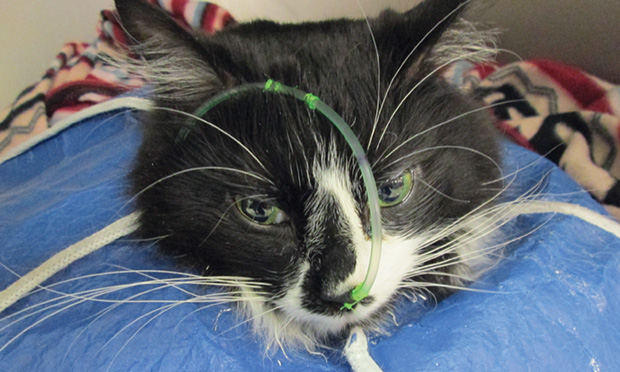
Pancreatitis in cats. Tube feeding may be required in the treatment of feline pancreatitis
Source: https://files.brief.vet/migration/article/20016/coc-feline-pancreatitis-pri-20016-article.jpg
Overview
Pancreatitis in cats is a disease caused by inflammation of the pancreas with the result that the cat’s pancreas starts to digest its own tissue. The pancreas is a vital organ that aids in metabolism of sugar in the body through the production of insulin, and is necessary for the digestion of nutrients by producing pancreatic enzymes. Therefore, pancreatitis can have serious consequences and can even be life-threatening. In many cases, no underlying cause for feline pancreatitis can be determined.
While presenting symptoms are often vague, anorexia (loss of appetite), dehydration, weight loss and lethargy may be observed. Many cats with pancreatitis will unfortunately elude detection even after diagnostic testing. To diagnose pancreatitis, other causes of the symptoms must be ruled out. Treatment is based on relieving the symptoms, providing nutritional support and preventing complications. In most cases, with early recognition and treatment, cats recover from pancreatitis, although recurrences are always possible.
Bow Wow Meow Pet Insurance can help protect you and your cat should an unexpected trip to the vet occur.
-
Find out more about our cat insurance options
-
Get an online pet insurance quote
Bow Wow Meow is proud to have been awarded winner of Canstar’s ‘Most Satisfied Customers’ Award in the Pet Insurance category for both 2024 and 2025!
Bow Wow Meow is proud to have been chosen as Product Review’s Pet Insurance Award Winner every year from 2018 to 2025! This is based on 2,995 independent customer reviews (as at 21/01/2025), with an overall rating of 4.3*
Google Review rating = 4.5* (based on 968 reviews)
Trust Pilot rating = 4.6* (based on 531 reviews)
Bow Wow Meow is proud to have been chosen as Product Review’s Pet Insurance Award Winner every year from 2018 to 2025! This is based on 2,995 independent customer reviews (as at 21/01/2025), with an overall rating of 4.3*
Google Review rating = 4.5* (based on 968 reviews)
Trust Pilot rating = 4.6* (based on 531 reviews)
Bow Wow Meow has been chosen as a winner in the Finder Pet Insurance Awards 2024. Finder’s panel of experts analysed over 140 quotes to award our Ultimate Care Plan the winner of the “Pet Insurance – Value” category.
More information
https://www.manhattancats.com/article-archive/gastroenterology/pancreatitis-in-the-cat
https://intercom.help/futurepet/pet-health-articles/pancreatitis-in-cats-pancreas-specific-lipase
https://vcahospitals.com/know-your-pet/pancreatitis-in-cats
https://www.petmd.com/cat/conditions/endocrine/c_ct_pancreatitis
https://www.cat-world.com.au/pancreatitis-in-cats.html






